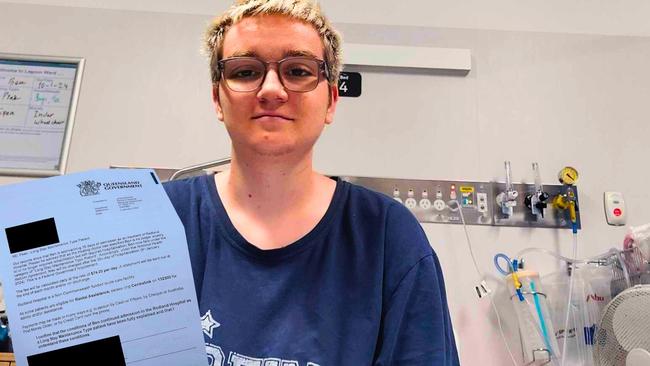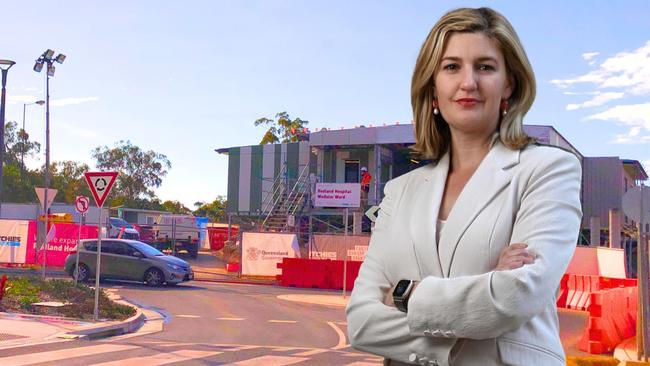Young NDIS patients stuck in hospitals, slugged $74/day to stay
Hundreds of Queenslanders are languishing in long-stay hospital beds as they wait for more suitable NDIS accommodation.

Logan
Don't miss out on the headlines from Logan. Followed categories will be added to My News.
Hundreds of Queenslanders are languishing in long-stay hospital beds as they wait for more suitable NDIS accommodation.
To add insult, patients left in hospitals are also being asked to pay a daily $74.20 ‘rent’ fee.
As of November 29 there were 863 long-stay patients in Queensland hospitals – a slight fall since August last year but a 36 per cent increase compared to the same time in 2022.
Of those, 272 were NDIS participants.
In the September 2023 quarter, the average time for a participant across the country to be discharged, when medically ready, was 24 days, reduced from 27 days in the June 2023 quarter and 30 days in the March quarter.
Of the state’s overall number of long-stay patients, 633 people are considered older patients while 230 are under 65.
Long-stay patients are regarded as medically fit for discharge but remain in hospital due to factors such as waiting for an aged care placement, disability accommodation and or support.

Redland Hospital, which chalked up one of the worst ramping rates in the state, is housing 29 long-stay patients including 21-year-old Benjamin Anne-George Barnett, who is living in the hospital while waiting for new NDIS accommodation.
The hospital, which has 210 beds, 232 doctors and 879 nurses, admitted a total of 9836 patients in the September quarter with 4765 emergency admissions.
Queensland Health data estimates long-stay patients cost the public health system about $1.7 million a day.
Benjamin was diagnosed with hypermobility from Elhers Danlos syndrome and has been living at Redland Hospital for 35 days, the cut-off time limit before fees are charged.
Benjamin said living at the hospital, where meals were provided, was not a permanent solution and that they wanted to find “peaceful” NDIS accommodation to live with beloved pet bird, a cockatiel called Sweetcheeks, who is not allowed in the hospital.
Last week, Redland Hospital’s revenue department approved Benjamin’s long-term accommodation status and instigated the daily fee of $74.20.
“The treating doctor has specified that Benjamin is no longer acutely ill or no longer requires rehabilitation but still requires hospitalisation,” the statement said.
“Ben now falls under the category of Long Stay Maintenance Type Patient.
“Accordingly, under the National Reform Agreement, fees will be charged after the 35th day of hospitalisation (January 9, 2024).”

The hospital’s revenue department said department said the fee was a federal government requirement but some patients were eligible for rental assistance through Centrelink.
It was likely Benjamin will move out of the hospital and be reunited with Sweetcheeks this month, after the NDIS this week increased funding to allow them to move into a two-person share house with a carer.
Prior to moving into the hospital, Benjamin had been living alone in an NDIS unit with around-the-clock care for a year.

But a series of mental health issues and an NDIS assessment resulted in a move to a Caboolture house with three other NDIS recipients from December 2022 to October last year.
After friction with others in the house and the carers, Benjamin moved to Eloma Care at Ormiston in October last year.
When at Eloma, a dispute flared up over rent payments, the issuing of prescription drugs and the level of care and the police were called.
“The police took me to Redland Hospital and a few days later, I was told that I was not allowed back at the house in Ormiston,” Ben-Anne said.
“Social services called my public guardian and my support co-ordinator who both said it was unsafe for me to be on the streets as I was considered a suicide, self-harm risk and at a high risk of being kidnapped or hurt due to being in a wheelchair.
“Luckily, the hospital has allowed me to stay and I have an NDIS review this week but I have had nothing but trauma from NDIS houses.”
The NDIA said it acknowledged some participants were experiencing delays leaving hospital due to issues such as a lack of appropriate housing or services available in the states.
“We are working to enhance the experience for everyone in the scheme,” an agency spokesperson said.
“The agency will continue to work closely with state and territory health systems and NDIS providers to discharge people as quickly possible once they are medically ready.”
In the September 2023 quarter, the average time for a participant across the country to be discharged, when medically ready, was 24 days, reduced from 27 days in the June 2023 quarter and 30 days in the March quarter.
Since September 2022, the NDIA has implemented a range of operational improvements to reduce hospital discharge delays, including increasing the number of dedicated hospital discharge staff supporting each state and territory, including additional hospital liaison officers and NDIS hospital discharge planners.
An alarming 39 per cent rise in the overall number of long-stay patients at Queensland Hospitals last year prompted the state government in November to commit a massive $200 million over two years to tackle the issue.
Health Minister Shannon Fentiman said the numbers of long-stay patients was equivalent to filling Rockhampton, Toowoomba and Redcliffe hospitals combined.

“These patients are one of the biggest pressures being faced by our health system, through no fault of their own,” Ms Fentiman said after announcing the funding.
“When people who should be in care are still in hospital, it means that someone else can’t use that bed.
“No one wants to be in hospital longer than they need to. If we can help them into more appropriate accommodation, with the right supports, then both the patients and the hospitals will benefit.”
Queensland Health said long-stay patients did not prevent a hospital from caring for other patients and the issue was not unique to Queensland or to Redland Hospital.
“We remain committed to providing high-quality healthcare to everyone who needs it, regardless of their discharge timeline,” a spokesperson said.
In the September quarter, more than 65 per cent of patients had to wait for more than 30 minutes to be transferred from an ambulance to Emergency Department clinical staff at Redland Hospital.
More Coverage
Originally published as Young NDIS patients stuck in hospitals, slugged $74/day to stay




